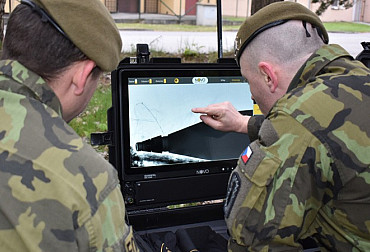Army continues to give hope
A unique project was created in 2012. Its aim is to find potential donors of bone marrow from the army and general public. The army returned to this project two years ago. In addition to this, it has created background for more than two thousand newly registered donors to this date.
Hundreds of people become ill with the diseases of the hematopoietic system in our country every year, including babies. Volunteers who are willing to donate hematopoietic cells are the last hope for the seriously ill. “Besides the regular blood donors, we have already had hundreds of registered donors of bone marrow in our ranks. We, soldiers, are aware of the fact that we are in the position of adequate donors of bone marrow and want to help,” the Brigadier General Lenka Šmerdová explains the military initiative.

Picture: The Brigadier General Lenka Šmerdová acts on behalf of the Army within the project “The Army gives hope” | army.cz
Laboratory of Success in Vyškov
“Higher health status requirements are imposed on the members of the Armed Forces and the Integrated Rescue System. Moreover, they are destined to reliability and, above all, they are willing to help,” explains Daniel Pagáč, the Director of the Czech National Marrow Donors Registry. This is the reason why the Command Training Centre – Military Academy Vyškov - took the role of the main initiator. Not only young soldiers but also active reservists, for instance, start their career right here.
“I would like to thank you for an important opportunity not only for the Registry, however, mainly for the important opportunity for ill patients,” added Pagáč. Subsequently, he called the Vyškov Department as the laboratory of success, which successfully informs not only about the project, but also about its own collection of hematopoietic cells.
Painful cell collection is only a myth
Anyone with good health status and aged between 18 and 35 years can join the Bone Marrow Donors Registry. Only 1 % out of the registered donors undergo the confirmatory examinations for a particular donor and approximately 0.5 percent undergo the actual collection once a year.

Picture: Young candidates that register in the Bone Marrow Donors Registry | army.cz
Currently, the hematopoietic cells are collected by the bone marrow aspiration from the pelvic bones under anaesthesia or by collecting stem cells, which is similar to plasma collection. The second option is without anaesthesia but lasts several hours. Nevertheless, in both cases, the consequence is not a long-term pain of a major or more intensive character. Similarly, both the ways of collection are not hazardous for donors.
“Out of nearly 600 new recruits we have 230 candidates who are interested in joining the Bone Marrow Registry. In general, we see that people are afraid of the Registry because they do not know how it works or what the collection involves. By providing them with relevant information, many volunteers immediately register. We tell ourselves that if we were able to save at least one human life it would be fantastic,” explains one of the instructors, the Sergeants Tomáš Stránský.

Picture: Sergeant Tomáš Stránsky (left) and Lieutenant David Svoboda (right) have been trying to break the myths about the bone marrow donation | army.cz
Bone marrow donation is a transnational project
“We’ve already had 92,600 registered bone marrow donors this year. Next year we would like to exceed one hundred thousand. I believe that cooperation with the Army will contribute to this significantly,” explains the Head of the Czech National Marrow Donor Registry, Pavel Jindra, and adds: “Since the establishment of the Registry in 2004, the adequate bone marrow has been donated to more than 1,700 patients, of which more than half were foreign donors.”
The National Registry itself cannot cover a wide range of the bone marrow needs. Nevertheless, the aim is to continue to expand the database by optimal home donors, which is cheaper and faster if needed. “The Army gives hope” is not only a project of the Army and the Czech National Marrow Donor Registry, but also of the Central Military Hospital – Military University Hospital in Prague and the Bone Marrow Transplant Foundation.
Olympic winner is the patron
The Czech modern pentathlete, the 2012 London Olympics winner, the European Champion in 2010 and a member of the Dukla Army Sports Centre, the Lieutenant David Svoboda has become the patron of the project. “I’ve had an opportunity to register at the mobile call-out team. I immediately learned all the information about donation. The blood collection itself took only a short period of time. I perceived it as an obligation to register,” says Lieutenant Svoboda.
There are currently nine donor centres in the Czech Republic. Nevertheless, all project participants see great potential in mobile collection facilities.





















